Back in 2008, when ERPNext was first built, it was designed to be a complete system, something that could help a small business manage everything in one place. Accounting, HR, inventory, projects, payroll... and of course, CRM. After all, every business needs customers, and every ERP needs a way to track them.
Over time, the CRM module in ERPNext did what it was supposed to. It helped teams track leads, manage opportunities, and close deals. But as more users came in with simpler needs, we started seeing the gaps. Not everyone needed stock entries or invoices. Some just wanted a good CRM – a place to manage leads, track conversations, close deals, and nothing more.
The Story of Frappe CRM
Our own sales team began to feel it too. As leads came in through forms, emails, WhatsApp, and partner referrals, the CRM module in ERPNext started to feel limited. It wasn’t built for that kind of flexibility or with sales-first thinking in mind.
Around the same time, during the COVID period, a wave of new products began at Frappe. Developers started building smaller tools focused on specific business problems, with a strong focus on user experience. One of them was Shariq Ansari. Having worked on Microsoft Dynamics CRM before joining Frappe, he had seen how CRMs often became too complex and made things harder for sales teams. He understood what was missing. And with support from the team, he set out to build something better.
So in 2023, Frappe CRM was born. A standalone app with a clean interface, built to solve real sales problems without the weight of a full ERP behind it. But that also left a few people wondering. Why are there two CRMs? Is the ERPNext CRM still relevant? Which one should I go with?
To help you decide, here’s a comparison across the areas that matter most.
| Area | ERPNext CRM | Frappe CRM |
|---|---|---|
| Type | Part of ERPNext suite | Standalone product |
| UI | Functional but ERP-like | Modern, crafted UI using Vue |
| Timeline View | Basic activity logs | Unified timeline of all activity and separate tabs to track calls, emails, tasks and notes. |
| Lead & Deal Flow | Lead → Opportunity → Quotation | Leads & Deals with stage-based pipelines, Quotation in ERPNext |
| Views | List, Kanban, Filters | List, Kanban, Public/Private Views, Pinned Filters |
| Integrations | Strong internal (Stock, Projects, etc.) | WhatsApp, Twilio, Exotel, ERPNext |
| Customization | Scripts, custom fields | Same as ERPNext, plus class-based scripts, layout editor |
| Campaigns | Email Campaign feature | Newsletter (Campaign module coming soon) |
| Mobile Access | Browser-based | Progressive Web App (PWA) |
Here’s a detailed explanation of how they stack up across key areas:
1. Lead & Deal Management
ERPNext CRM follows a traditional structure: you create a Lead, convert it into an Opportunity, and then connect it to a Quotation or Sales Order. It works well when your sales flow is tied closely to stock, delivery, and accounting. It also offers features like Kanban view and filters, but the overall interface still feels like part of a larger ERP system.
Frappe CRM simplifies this. It uses Leads and Deals, with a clean pipeline designed for sales. The drag-and-drop Kanban board, quick filters, and stage-based tracking help you stay focused and move faster. Tasks, notes, and call logs can be added right inside a Lead or Deal, so everything stays in one place which is perfect for fast-moving teams who want to stay organized.
Each Deal also supports expected closure dates, win probabilities, and product-level details. This makes it easier to track what you’re selling, estimate potential revenue, and stay ahead of your pipeline.
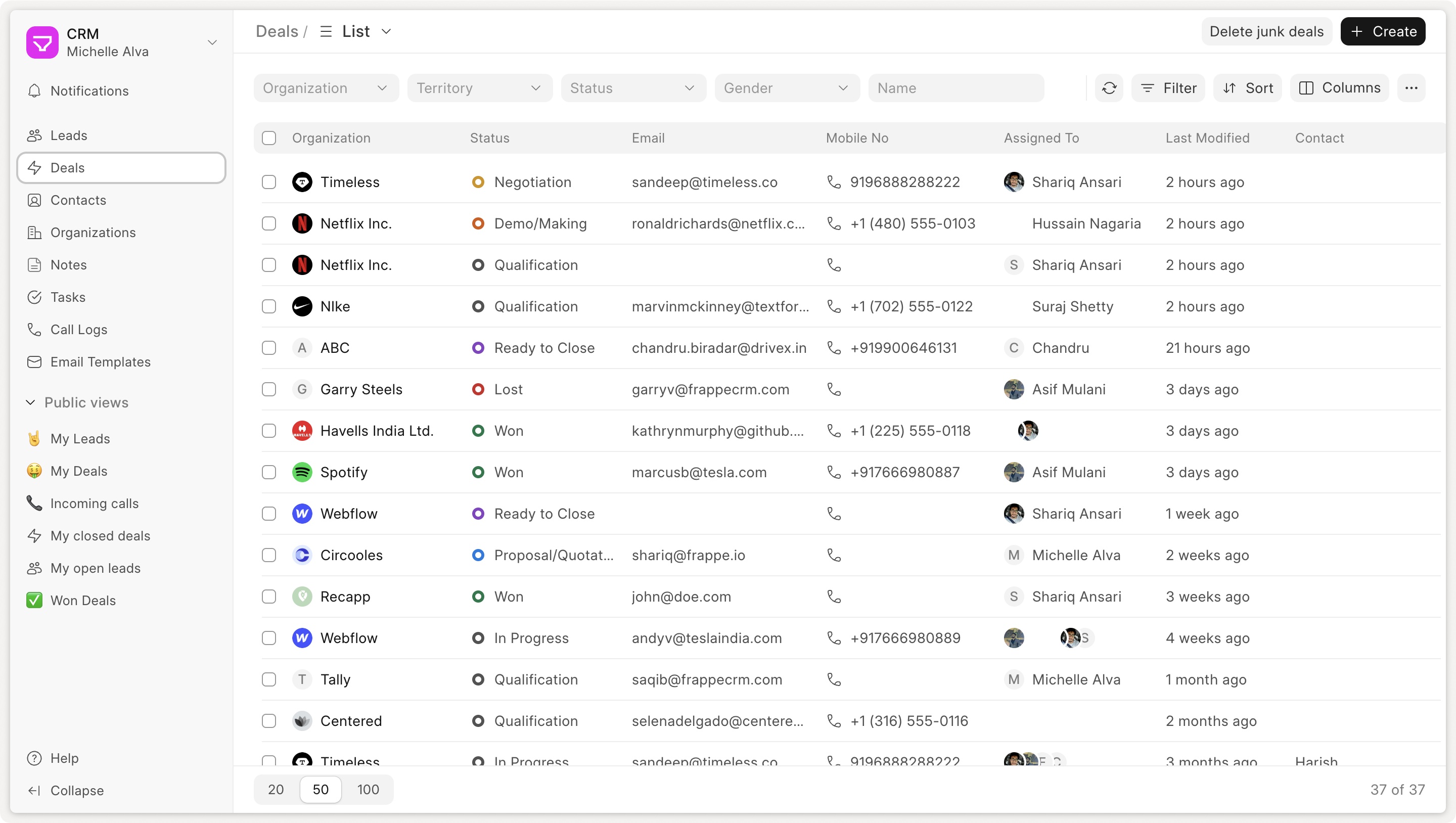
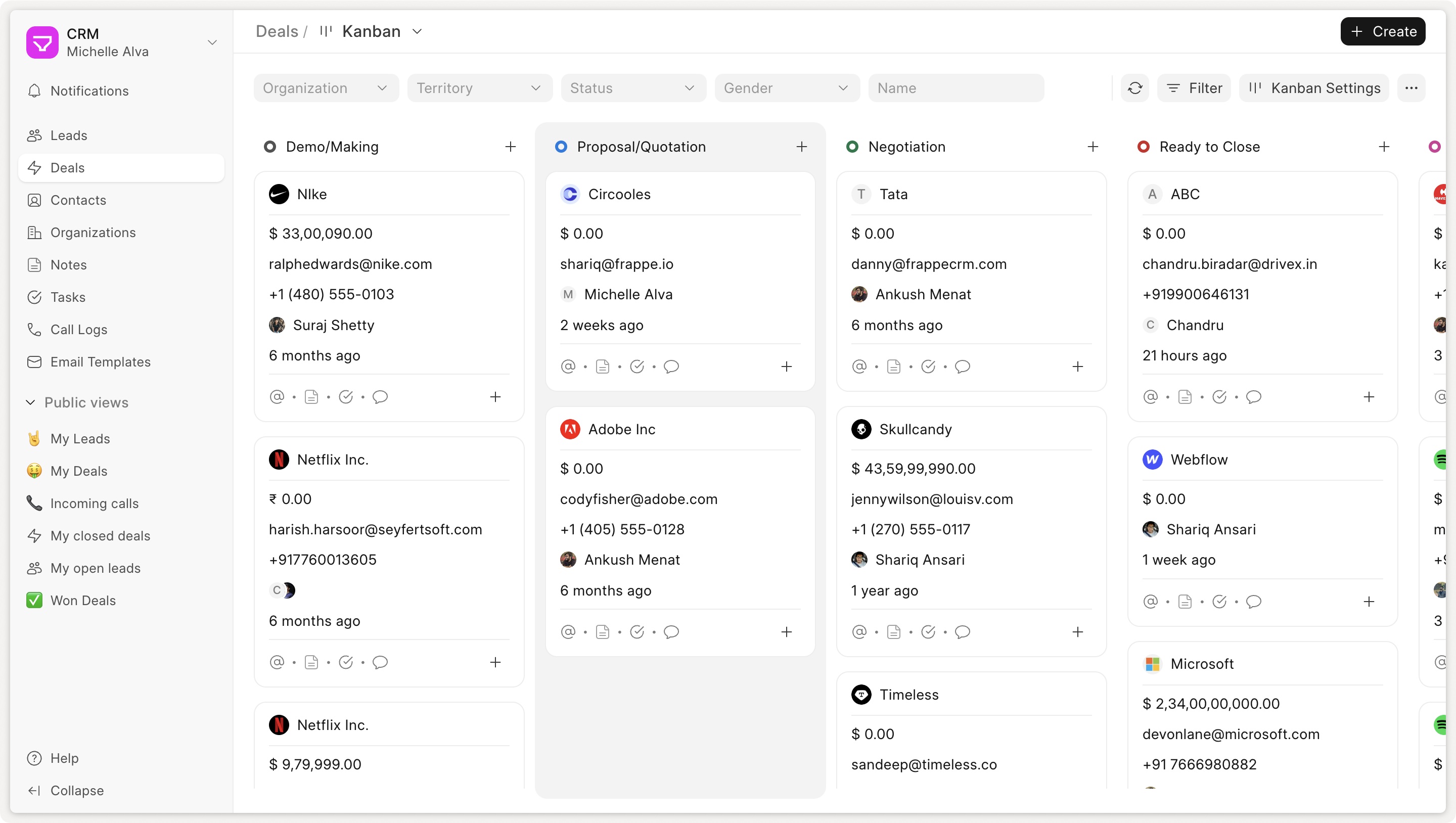
2. Interface & Experience
ERPNext CRM’s UI is consistent with the rest of the ERP. It’s structured and functional, but it feels more like a backend system than a sales tool.
Frappe CRM on the other hand is built on Vue.js, a reactive frontend framework. This means fewer reloads, instant updates, and a smoother experience overall. It also uses Frappe UI, a modern design system that brings clarity and polish. The result is an interface that feels crafted, not generic.
While Frappe CRM runs primarily on the frontend, some features like data import and newsletter still rely on the backend (Desk). But we’re actively moving more into the front end. Many configurations like email accounts, SLAs, and assignment rules are already available in-app.
3. Integrations
Sales teams rarely work in isolation. Calls, messages, emails, and follow-ups all happen across different tools. That’s where integrations matter. ERPNext CRM is tightly linked to internal modules like quotations, invoices, inventory, and projects. But when it comes to external tools like WhatsApp or Twilio, you’ll need to build it yourself through the desk.
Frappe CRM already supports WhatsApp, Twilio, Exotel, and email sync out of the box. And if you're using ERPNext alongside it, you can push a won deal to ERPNext to generate a quotation.
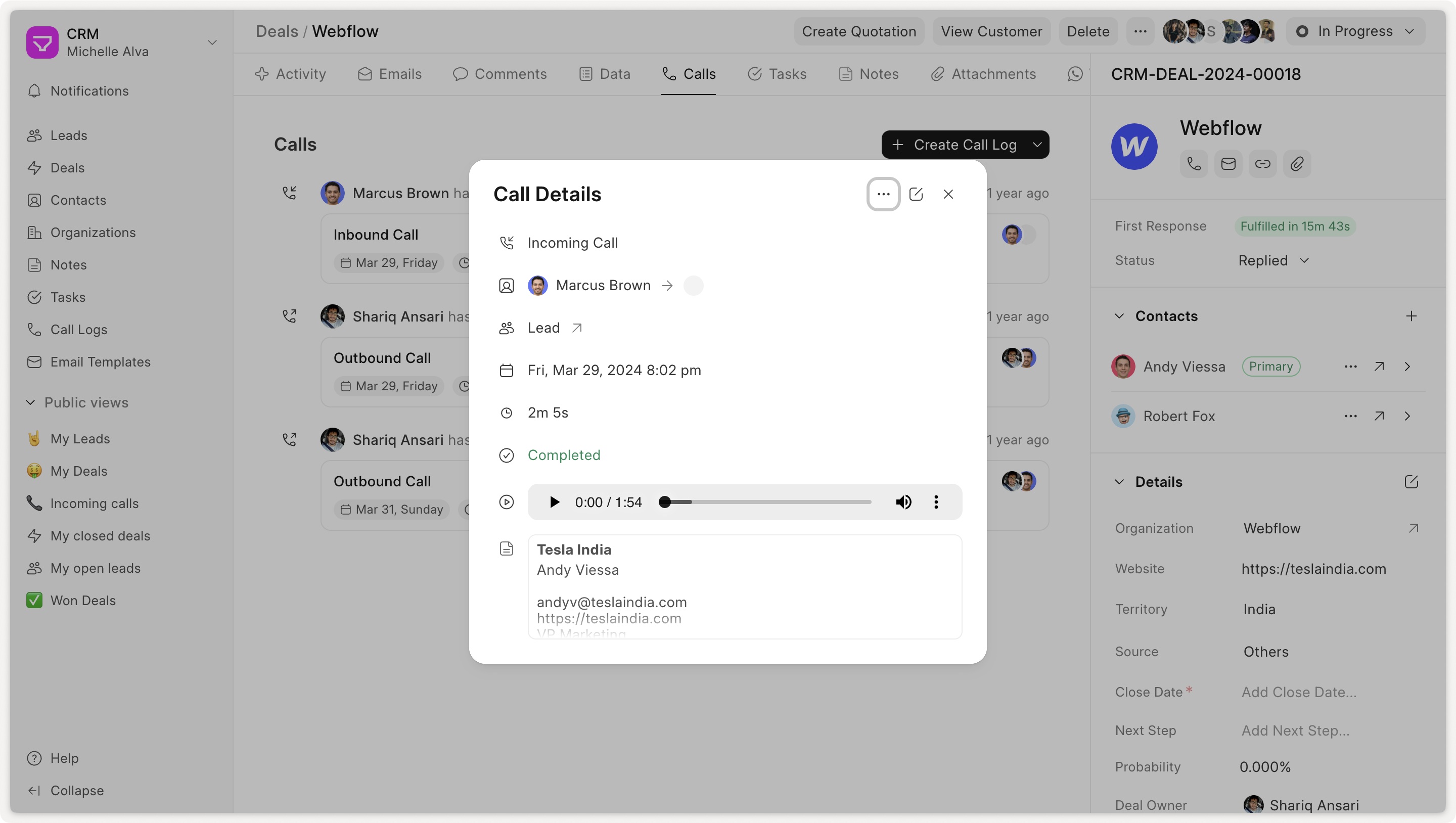
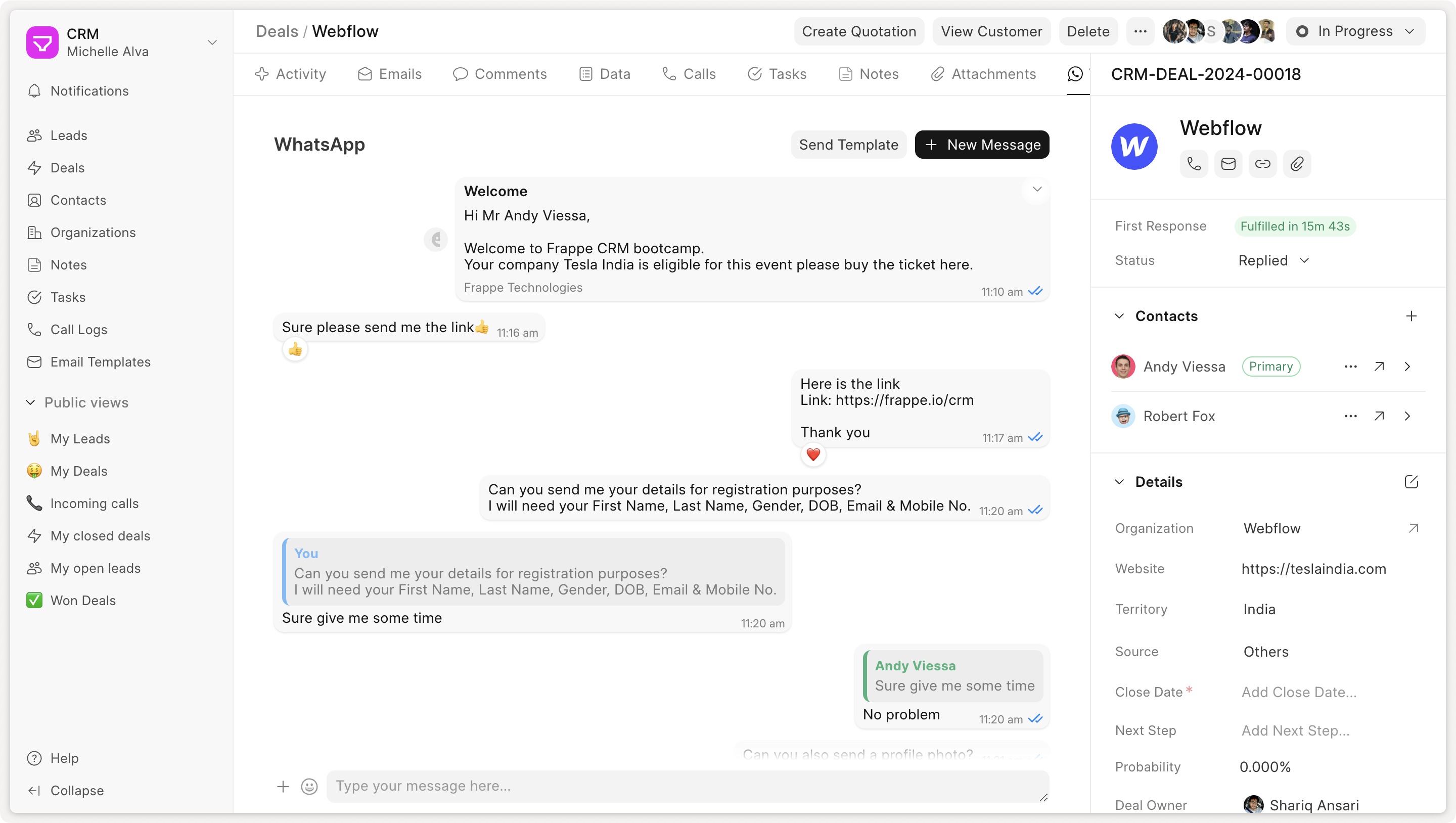
We’re also working on native social media integrations. Soon, you’ll be able to bring in leads directly from LinkedIn, Facebook, Instagram, and WhatsApp making lead capture and campaign management even more seamless.
4. Customization & Flexibility
Both CRMs support server and client scripts. But in Frappe CRM, we’ve gone a step further. You can rewrite the client scripting layer using a class-based approach for Vue-based apps. It’s more reactive, better structured, and easier to manage complex UI logic.
You can also add custom fields, edit layouts, and create quick-entry side panels in Frappe CRM making the customization experience faster and more intuitive for end users. If you want to dive deeper, we’ve even written a blog on how to write class-based client scripts in Vue apps like Frappe CRM.
5. Views & Reporting
Both ERPNext and Frappe CRM offer flexible ways to view and filter your data. ERPNext supports saved filters, list views, and comes with a set of ready-made reports and charts to help you get started quickly.
Frappe CRM includes the same core capabilities, with a few added touches that improve the everyday experience. You can create Public or Private views, pin frequently used views to your sidebar, and toggle between List and Kanban layouts. These features make it easier to personalize your workspace and collaborate with your team.
While Frappe CRM doesn’t yet have a built-in dashboard module, one is currently in development. Until then, you can connect it to Frappe Insights to create your own charts and dashboards using any field from your CRM to visualize sales data the way you want. Whether it's monthly conversion trends, deal size by product, or revenue projections by probability, Insights gives you the flexibility to visualize it all. And with the upcoming CRM dashboard, you’ll be able to track your sales funnel and pipeline metrics directly inside Frappe CRM.

6. Campaigns
The Frappe Framework comes with a built-in Newsletter feature that lets you send bulk emails to different email groups. These groups can be potential leads, existing customers, or segmented lists based on industry, region, or any tag you choose. It’s a simple way to stay in touch and you don’t need the ERPNext app to use it, just access it via the Desk.

ERPNext has its own Email Campaigns feature, which lets you send emails, track success metrics, and convert responses into leads or opportunities.
Frappe CRM, for now, doesn’t have a dedicated campaign module built in. But we’re actively working on introducing one. Until then, the newsletter feature from the framework works well for basic outreach and many teams are already using it that way.
7. Unified Timeline
Unlike ERPNext, Frappe CRM comes with a Unified Timeline — a single view that shows all key interactions like emails, calls, status updates, and assignments for each lead or deal.
This was one of the core ideas behind the UI: to keep everything important in one place, so sales teams never lose context.
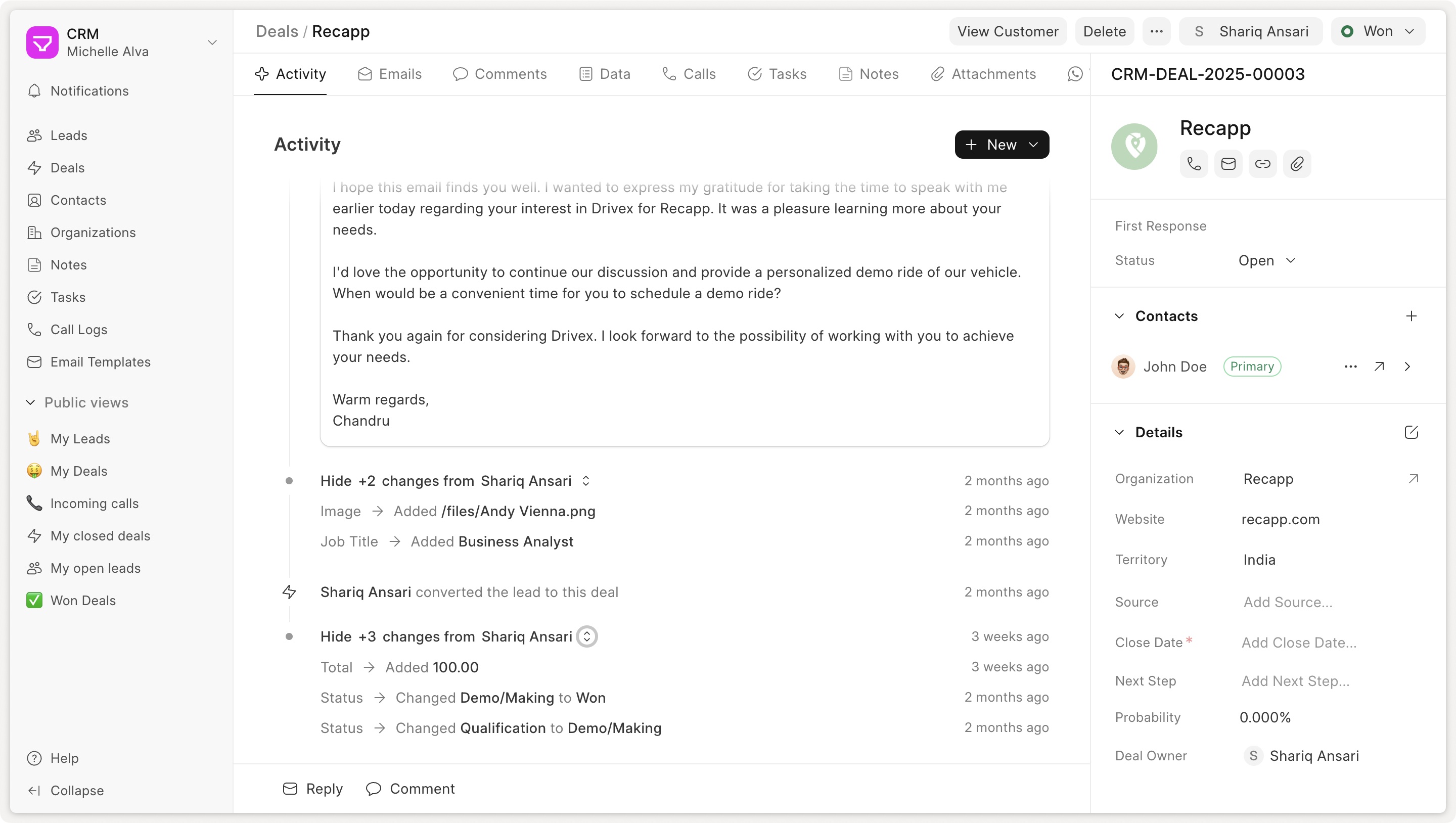
8. Mobile & Accessibility
ERPNext doesn’t have a native app, but it is mobile-responsive. You can use it on your phone or tablet through a browser, and most core functions work fine though the experience is more suited to occasional access than full-time mobile use since it is an ERP.
Frappe CRM, on the other hand, is built as a Progressive Web App (PWA). You can “install” it on your phone like a regular app, open it in one tap, and get a faster, more consistent experience across devices. It’s designed to work well on the go without compromising layout or performance.
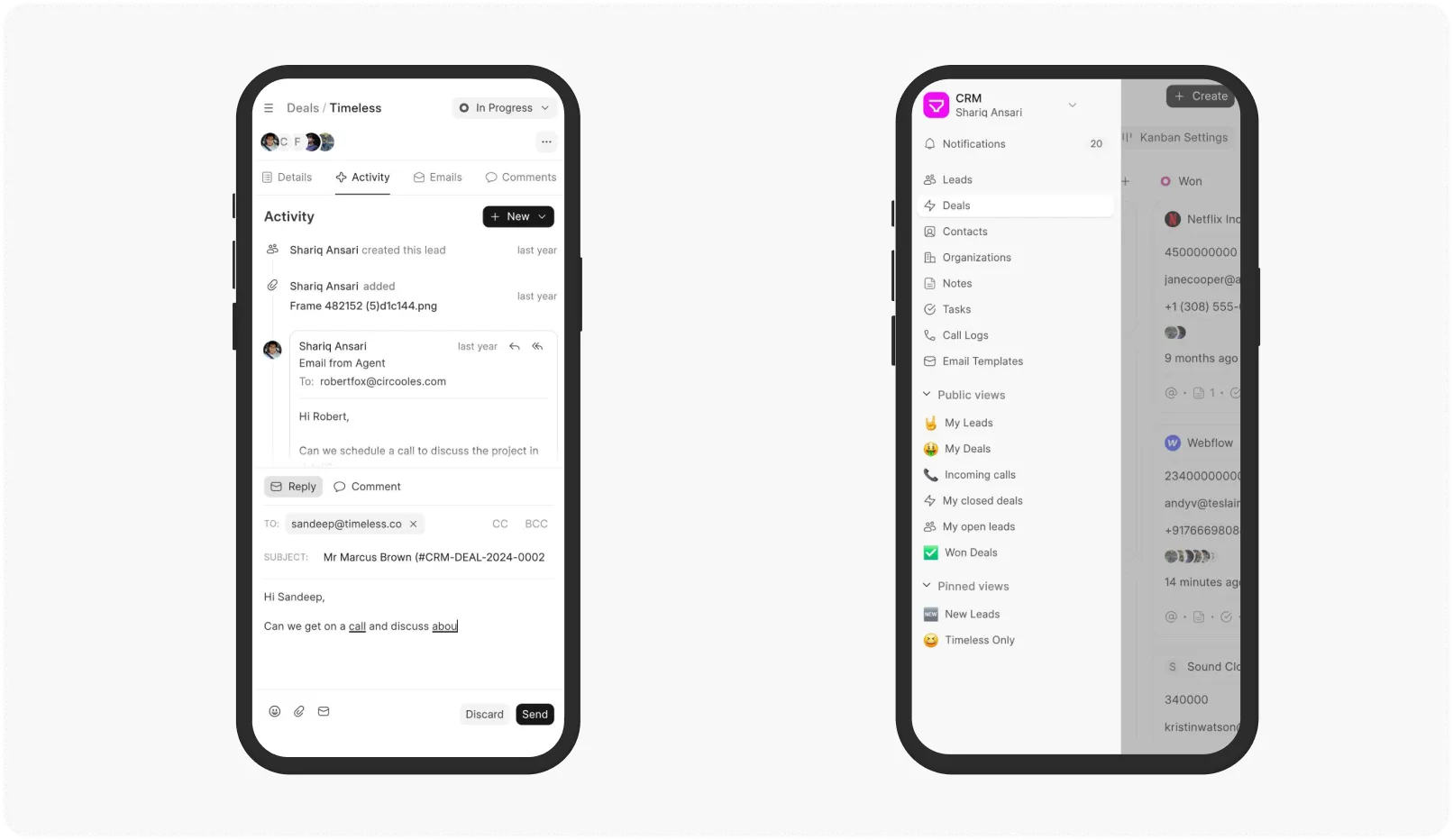
Why do ERPNext CRM and Frappe CRM both exist?
We get this question a lot. Here's how to think about it:
If you're new to the Frappe ecosystem
Start with Frappe CRM. It’s built as a standalone, modern CRM for sales teams and is lighter, faster, and more focused. No dependency on ERPNext. This is where we’re investing our energy going forward.
If you're using ERPNext CRM today
You can continue using it as is. We’re still maintaining it with bug fixes, but it’s not evolving further. No new features are being added.
We’re also working on a migrator to make the switch to Frappe CRM easy. The integration with ERPNext is already in place, and we’re rewriting parts of the ERPNext experience in Vue to improve compatibility. If you’d like to move sooner, you can also use the standard data import tool to bring in your leads, contacts, and opportunities.
Our direction
Frappe CRM is the future. ERPNext CRM served its purpose, but it was always secondary to accounting and operations.
With Frappe CRM, we’ve built a dedicated team and given it the focus it deserves. It’s already production-ready and will only keep getting better.




·
Hello, Does Frape CRM integrates with other base accounting systems(Pastel Partner/Sage 50c)?
·
Thanks, the article is informative. However it is inspiring me to try the CRM feature. May be a few use cases and testimonials on the way would help. Regards Manoj
·
It does seem like the new Frappe CRM runs the risk of catering more to a consumer crowd than the B2B crowd that ERPNext currently caters to.
·
ERPNExt CRM uses LPO(Leads>Prospects>Opportunities>) method, while frappe CRM is LEads> Deals, how will the migration be handled in this case, if we dont have the same functionalities implemented in both the 2 Apps.
·
Finally, answer to a question that I have been looking for.
·
Hey, you can check this link for user documentation: https://docs.frappe.io/crm/introduction
and this link for a quick setup guide to get started: https://frappe.io/crm/setup-guide
·
Would you please share the use guide for setup and use?